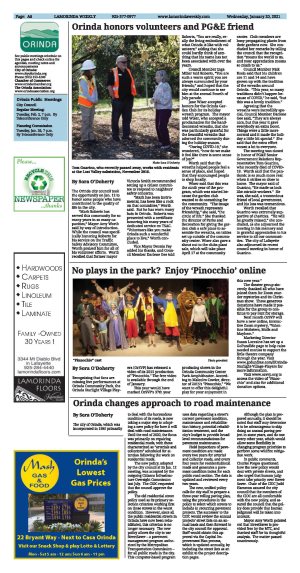| | Published January 20, 2021
| Orinda changes approach to road maintenance
| | | By Sora O'Doherty | | |
The city of Orinda, which was incorporated in 1985 primarily to deal with the horrendous condition of its roads, is now taking a major step in adopting a new policy for how it will deal with road maintenance. Until the end of 2020, the focus was primarily on repairing residential roads, with those characterized as "arterials and collectors" scheduled for attention following the work on residential roads.
 The new policy, adopted by the city council at its Jan. 12 meeting, was accepted by the outgoing Citizens Infrastructure Oversight Commission last July. The CIOC requested that the council approve the policy.
The new policy, adopted by the city council at its Jan. 12 meeting, was accepted by the outgoing Citizens Infrastructure Oversight Commission last July. The CIOC requested that the council approve the policy.
 The old residential street policy used as its primary selection criterion working first on those streets in the worst condition. However, since all the public residential streets in Orinda have now been rehabilitated, this criterion is no longer necessary. The new policy allows the city to use StreetSaver - a pavement management program authorized by the Metropolitan Transportation Commission - for all public roads in the city. This computer-based program uses data regarding a street's current pavement condition, maintenance and rehabilitation history, potential rehabilitation treatment, and the city's budget to provide broad level recommendations for pavement maintenance.
The old residential street policy used as its primary selection criterion working first on those streets in the worst condition. However, since all the public residential streets in Orinda have now been rehabilitated, this criterion is no longer necessary. The new policy allows the city to use StreetSaver - a pavement management program authorized by the Metropolitan Transportation Commission - for all public roads in the city. This computer-based program uses data regarding a street's current pavement condition, maintenance and rehabilitation history, potential rehabilitation treatment, and the city's budget to provide broad level recommendations for pavement maintenance.
 Field inspections of pavement condition are made every two years for arterial and collector roads, and every four years for residential/local roads and generates a pavement condition index for each public road section. The data is updated and reviewed every two years.
Field inspections of pavement condition are made every two years for arterial and collector roads, and every four years for residential/local roads and generates a pavement condition index for each public road section. The data is updated and reviewed every two years.
 The new, unified policy calls for city staff to prepare a three-year rolling paving plan, using the procedures in the policy to select which streets to include in recurring pavement projects. The successor to the CIOC would review the annual projects' street lists on an annual basis and then forward to the city council for approval. Staff would obtain this approval via the Capital Improvement Plan process, which is updated annually, by including the street lists as an exhibit to the project description pages.
The new, unified policy calls for city staff to prepare a three-year rolling paving plan, using the procedures in the policy to select which streets to include in recurring pavement projects. The successor to the CIOC would review the annual projects' street lists on an annual basis and then forward to the city council for approval. Staff would obtain this approval via the Capital Improvement Plan process, which is updated annually, by including the street lists as an exhibit to the project description pages.
 Although the plan is prepared annually, it should be noted that staff may determine it to be advantageous to skip doing an annual paving project in some years, and do one every other year, which would allow some flexibility in changing program priorities to perform some wildfire mitigation work.
Although the plan is prepared annually, it should be noted that staff may determine it to be advantageous to skip doing an annual paving project in some years, and do one every other year, which would allow some flexibility in changing program priorities to perform some wildfire mitigation work.
 In public comments, Charles Porges questioned how the new policy would deal with private streets, and also urged that human judgment take priority over StreetSaver. Chair of the CIOC Judd Hammon assured the city council that the members of the CIOC are all comfortable with the new policy, and assured the council that the policy does provide that human judgment will be taken into account.
In public comments, Charles Porges questioned how the new policy would deal with private streets, and also urged that human judgment take priority over StreetSaver. Chair of the CIOC Judd Hammon assured the city council that the members of the CIOC are all comfortable with the new policy, and assured the council that the policy does provide that human judgment will be taken into account.
 Mayor Amy Worth pointed out that StreetSaver is provided free by the MTC, and thanked staff for its thoughtful analysis. The matter passed unanimously.
Mayor Amy Worth pointed out that StreetSaver is provided free by the MTC, and thanked staff for its thoughtful analysis. The matter passed unanimously. |
| | | | | | | | | | | | |


